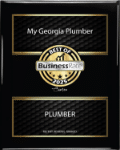You've heard the hype but are Tankless Water Heaters all that? Our answer? Yep! They are all that and a bag of chips!
Why? For so many reasons ranging from the savings to the consistent hot water. Let's discuss the pros and the cons and what makes it THE water heater to own.
The Pros
- Energy Efficiency and Tax Credits:
- Tankless water heaters only heat water when needed, unlike traditional tank-style heaters that continuously heat water in a storage tank. This on-demand heating reduces energy consumption and can lead to lower utility bills. There are also Energy Efficient credits you can claim on your taxes.
- Space Saving:
- Tankless water heaters are compact and wall-mounted, freeing up valuable floor space compared to bulky tank-style water heaters. This can be particularly advantageous for homes with limited space or those looking to maximize storage areas.
- Endless Hot Water:
- Tankless water heaters provide a continuous supply of hot water, as they heat water on demand. This means no more running out of hot water during long showers or while doing laundry, offering convenience and comfort to household occupants.
- Longer Lifespan:
- Tankless water heaters typically have a longer lifespan compared to traditional tank-style heaters. With proper maintenance, tankless units can last up to 20 years or more, whereas tank-style heaters typically last around 10-15 years. This longer lifespan can result in cost savings over time due to reduced replacement frequency.
The Cons
- Higher Initial Cost:
- Tankless water heaters tend to have a higher upfront cost compared to traditional tank-style water heaters. The unit itself can be more expensive to purchase, and installation may require modifications to the home's plumbing and electrical systems, increasing the overall cost of implementation.
- Limited Flow Rate:
- Although tankless water heaters provide hot water on demand, they may struggle to meet the simultaneous hot water demands of multiple appliances or fixtures in larger households. If multiple showers or appliances are used simultaneously, the flow rate of hot water may decrease, leading to a reduction in water pressure or temperature.
- Cold Water Sandwich Effect:
- Some tankless water heaters may experience a phenomenon known as the "cold water sandwich effect." This occurs when there is a momentary fluctuation in water temperature, resulting in a brief burst of cold water between periods of hot water flow. While this issue is not present in all tankless models, it can be a nuisance for some users.
- Potential for High Installation Costs:
- Installing a tankless water heater may require upgrades to the home's gas line, venting system, or electrical wiring, particularly if switching from a traditional tank-style heater. These additional installation requirements can lead to higher labor costs and may require professional expertise, adding to the overall expense of the project.
Taking the plunge to tankless:
- Hot Water Demand
- Assess your household's hot water demand to determine the appropriate size and capacity of the tankless water heater. Consider the number of bathrooms, appliances, and fixtures that will be using hot water simultaneously. A higher demand requires a unit with a higher flow rate to ensure a consistent hot water supply throughout the household.
- Fuel Type and Energy Efficiency:
- Tankless water heaters are available in electric, gas (natural gas or propane), and hybrid models. Consider the availability and cost of energy sources in your area, as well as the energy efficiency ratings of different models. Look for units with high energy efficiency ratings (such as Energy Star certification) to minimize operating costs and environmental impact.
- Installation Requirements and Space:
- Evaluate the installation requirements and available space for the tankless water heater. Tankless units typically require adequate ventilation, access to gas lines or electrical wiring, and sufficient clearance for installation. Determine if any modifications or upgrades to your home's infrastructure will be necessary to accommodate the new unit, and ensure there is enough space for installation, especially if replacing a traditional tank-style heater.
- Maintenance and Longevity:
- Consider the maintenance requirements and expected lifespan of the tankless water heater. While tankless units generally require less maintenance compared to tank-style heaters, they may still require periodic flushing to remove mineral deposits and ensure optimal performance. Additionally, research the warranty coverage and reliability of different brands and models to choose a unit that offers long-term durability and peace of mind.
By carefully considering these factors, you can select a tankless water heater that meets your household's hot water needs efficiently and effectively. Of course, you can also call us here at My Georgia Plumber to discuss your questions with a professional who will be able to assist you in making the decision.










